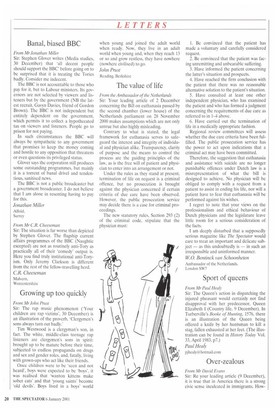The value of life
From the Ambassador of the Netherlands Sir: Your leading article of 2 December concerning the Bill on euthanasia passed by the second chamber (lower house) of the Netherlands parliament on 28 November 2000 makes assumptions which are not only untrue but also highly misleading.
Contrary to what is stated, the legal framework for euthanasia serves to safeguard the interest and integrity of individual and physician alike. Transparency, clarity of purpose and the means to control the process arc the guiding principles of the law, as is the free will of patient and physician to enter into an arrangement or not.
Under the rules as they stand at present, termination of life on request is a criminal offence, but no prosecution is brought against the physician concerned if certain criteria of due care have been observed. However, the public prosecution service may decide there is a case for criminal proceedings.
The new statutory rules, Section 293 (2) of the criminal code, stipulate that the physician must: 1. Be convinced that the patient has made a voluntary and carefully considered request.
2. Be convinced that the patient was facing unremitting and unbearable suffering.
3. Have informed the patient concerning the latter's situation and prospects.
4. Have reached the firm conclusion with the patient that there was no reasonable alternative solution to the patient's situation.
5. Have consulted at least one other independent physician, who has examined the patient and who has formed a judgment concerning the requirements of due care as referred to in 1-4 above.
6. Have carried out the termination of life in a medically appropriate fashion.
Regional review committees will assess whether the due care criteria have been fulfilled. The public prosecution service has the power to act upon indications that a criminal act may have been committed.
Therefore, the suggestion that euthanasia and assistance with suicide are no longer punishable offences under Dutch law is a misrepresentation of what the bill is designed to achieve. No physician will be obliged to comply with a request from a patient to assist in ending his life, nor will a patient have to fear that euthanasia will be performed against his wishes.
I regret to note that your views on the professionalism and ethical behaviour of Dutch physicians and the legislature leave little room for a serious consideration of the facts.
I am deeply disturbed that a supposedly serious magazine like The Spectator would care to treat an important and delicate subject — as this undoubtedly is — in such an irresponsible and uninformed manner.
W. 0. Bentinck van Schoonheten
Ambassador of the Netherlands, London SW7


















































 Previous page
Previous page